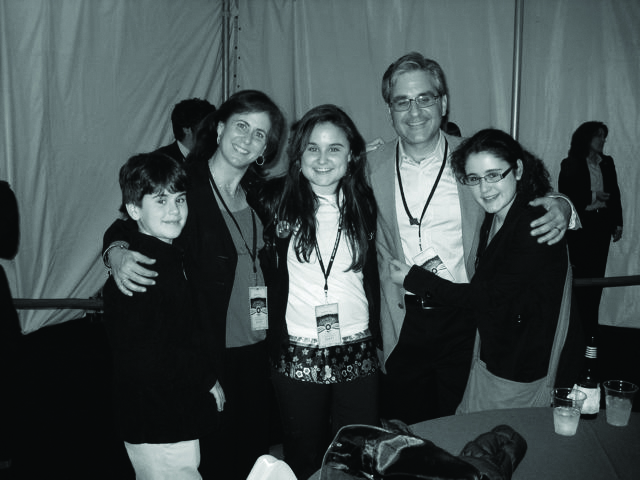Rivkin and Moelis: Together in Public Service
Bob Rivkin and Cindy Moelis exude an energy and enthusiasm born of their longtime commitment to public service. And while their path to Washington was at times winding, they are both putting their expertise, passion, and talents to work for an administration they believe in deeply, right at the heart of government.
Bob and Cindy met at Stanford Law School and graduated together in 1987, both keenly aware of the many doors that a JD degree could open.
Bob’s dad was a lawyer and active in the Democratic Party, serving as U.S. ambassador to Luxembourg and Senegal during the Kennedy and Johnson administrations. “I grew up with a sense of the vitality of politics and with a strong interest in public policy and public service,” he says, adding that his godfather was Hubert Humphrey.
Cindy, whose dad and older brother were both lawyers-turned-businessmen, says she came to law school “seeking a solid grounding in legal knowledge and critical thinking, as well as a credential that would be valuable in any marketplace.”
After spending their summers working as summer associates in law firms, the two decided to pursue government service, taking externships in Washington, D.C., during the first semester of their 3L year—Bob with the Federal [Public] Defender Service and Cindy with the Justice Department.
Energized by the experience, they moved to Chicago, where Bob had grown up. There Bob clerked for Judge Joel M. Flaum of the Seventh Circuit and Cindy worked for the National Committee for the Prevention of Child Abuse.
The couple put down roots and became involved in local politics and life. When Richard M. Daley began his mayoral bid, Bob and Cindy both volunteered. Bob did policy work for the campaign and was tempted to join the mayor’s staff postelection, but he chose instead to hone his legal skills as an assistant U.S. attorney. “I found my experience in the federal defender’s office to be compelling and I wanted to make sure I acquired the necessary tools to practice law,” he says.
Cindy, in turn, accepted a position with the mayor’s chief policy advisor. “I was an assistant to the mayor on policy regarding health care, human services, and education, which gave me great opportunity to affect the issues that I really cared about,” she says. She then moved to city hall and a job with the mayor’s chief of staff. And that’s where Cindy met Michelle Robinson and eventually served on the inaugural board of directors of Public Allies Chicago, a nonprofit dedicated to training young community leaders, which was launched by the future first lady.
Throughout her career, Cindy focused on social policy—including serving as the executive director of the mayor’s Youth Development Task Force, working for President Adele Simmons of the MacArthur Foundation, and serving as the executive director of The Pritzker Traubert Family Foundation, which supports efforts to improve Chicago’s public school system.

Bob, meanwhile, was ready to make a change after several years in the U.S. Attorney’s Office and two years doing legal policy work at Chicago’s Corporation Council. But he couldn’t decide between moving to the mayor’s office or taking a position with the Justice Department in D.C. Then a friend introduced him to U.S. Associate Attorney General John Schmidt, who had also served in the mayor’s office as Daley’s first chief of staff.
The result of that conversation was completely unexpected: “John Schmidt was deciding to run for governor of Illinois and offered me a job helping run his campaign,” Bob recalls. And though Schmidt lost the 1998 primary, Bob says it was a great year nonetheless. It expanded Bob’s political education and allowed him to work with future Obama administration appointees, including David Axelrod and Liz Sears Smith.
After the campaign, Bob moved in and out of the private sector, serving as a litigation partner at a large law firm, then general counsel of the Chicago Transit Authority, and finally deputy general counsel at Aon Corporation, a global risk management and insurance brokerage firm.
Then when fellow Chicagoan Barack Obama announced his candidacy for president, Bob and Cindy signed up to help right away, joining the National Finance Committee. Bob served as a policy advisor, the position later evolving into transportation committee co-leader and ultimately into U.S. Department of Transportation transition team member.
Following the general election, Bob was appointed general counsel of the Department of Transportation. At the DOT, he oversees 500 attorneys who represent 10 agencies that employ more than 55,000 people. “I’ve done everything from running the multibillion dollar ‘Cash for Clunkers’ program to establishing a Passenger Bill of Rights for air travelers,” he says.
Cindy was appointed director of the prestigious White House Fellows program, which selects up to 19 emerging leaders each year to receive firsthand experience in the federal government. “The fellowship program is extremely selective and the fellows are an exceptional group of individuals with diverse backgrounds and areas of expertise ranging from military to medicine,” she explains. “And each year I learn much from this group.”
Neither Bob nor Cindy is sure what the next move will be—and a lot will depend on the upcoming 2012 election. But so far, they’ve had a great ride.
“We’ve been unbelievably fortunate to be part of this moment in history and to have exposure to such amazing leaders,” says Cindy. “It’s been serendipity,” adds Bob. SL
